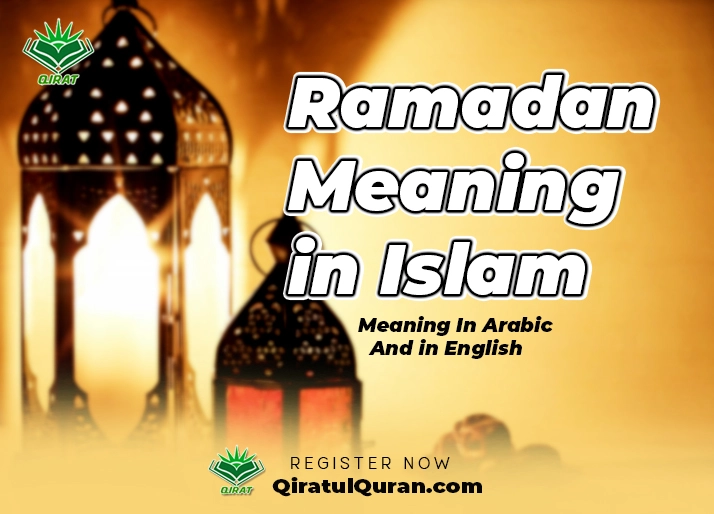Ramadan Meaning: Ramadan is the ninth month of the Islamic lunar calendar and is observed by Muslims worldwide as a month of fasting, prayer, reflection, and community. The observance of Ramadan is one of the Five Pillars of Islam, making it an obligation for all Muslims. The month has great spiritual significance and serves to renew one’s focus on faith and acts of worship.

1- What is the Purpose of Ramadan?
The main purposes of Ramadan Meaning include:
-
Strengthening One’s Relationship with Allah
By fasting and focusing more intensely on prayer and recitation of the Quran during Ramadan, Muslims aim to strengthen their relationship with Allah. The act of fasting allows Muslims to practice self-control and sacrifice as a way of worshipping Allah. This also encourages generosity and reminding oneself of the blessings Allah has bestowed.
-
Practicing Self-Reflection and Spiritual Discipline
Fasting enables Muslims to practice self-reflection, self-control, sacrifice, and sympathy for the less fortunate. By refraining from habits and activities that many indulge in throughout the rest of the year, Muslims can focus solely on spiritual disciplines during the holy month.
-
Community and Solidarity
Ramadan is often observed by communities coming together for the fast and iftar meals after sunset. The unity and sense of community this brings for Muslims can be considered another purpose alongside the more personal spiritual goals.
2- What is the Story Behind Ramadan?
According to Islamic belief, the holy month of Ramadan is observed to commemorate the month in which the first verses of the Quran, Islam’s holy book, were revealed to the Prophet Muhammad in 610 CE. The story goes that the Prophet Muhammad S.A.W was meditating in a cave called Hira outside of the city of Mecca when the angel Jibreel (Gabriel) came to Prophet Muhammad S.A.W and revealed the first verses of the Quran.
These first verses to be revealed are understood to be from the 96th chapter of the Quran, Surah Al-‘Alaq. The passage details how Muslims should read, pray, and worship Allah, who created man from nothing. This event is known as Layat al-Qadr, or the “Night of Power/Destiny”. It is believed to have occurred during the last 10 nights of Ramadan, either the 25th, 27th, or 29th, though its exact date is unknown.
To honor and commemorate the revelation of the Quran and how it changed Muslim destiny forever, Ramadan and its fasting rituals are observed by Muslims worldwide.
3- What the Quran Says About Ramadan
The main passages in the Quran referring to Ramadan and fasting can be found in Surah Al-Baqarah verses 183-185:
“O you who have believed, decreed upon you is fasting as it was decreed upon those before you that you may become righteous. [Fasting for] a limited number of days. So whoever among you is ill or on a journey [during them] – then an equal number of days [are to be made up]. And upon those who are able [to fast, but with hardship] – a ransom [as substitute] of feeding a poor person [each day]. And whoever volunteers excess – it is better for him. But to fast is best for you, if you only knew.”
From this passage, Muslims understand fasting during Ramadan to be a duty and are exempt only in cases of traveling or illness. Those unable to fast due to health reasons may donate meals to the needy instead.
4- Why is Ramadan Called So?
The word Ramadan originates from the Arabic root word ‘ar-ramad’ which means intense, scorching heat. It is believed Ramadan was named as such to represent the burning sensation a fasting person feels in their stomach as they abstain from food and drink from dawn to sunset. Another reason comes from the burning away of sins through good deeds and fasting.
5- What are the 4 Benefits of Ramadan?
Some of the key benefits Muslims gain from observing Ramadan include:
1. Gaining Taqwa (God-Consciousness)
By fasting and focusing on spiritual self-reflection during Ramadan, Muslims strive to become more conscious of Allah in their thoughts and actions. Gaining greater taqwa and closeness to Allah is the primary goal.
2. Learning Patience
Fasting requires Muslims to have patience and self-control throughout the intense hunger and thirst that accompanies a fast. This patience gained during Ramadan is hoped to translate into greater patience in general life.
3. Improving Health
Though fasting requires abstinence from food and water, several health benefits have been associated with fasting in moderation. Benefits cited include detoxification, weight loss, and improving blood pressure and cholesterol levels. However, some exemptions apply to those with health conditions making fasting dangerous.
4. Gaining Understanding
By personally feeling the pains of hunger and thirst, Muslims gain empathy and understanding for those in the world who feel hunger regularly due to poverty. This realization should compel Muslims to be more generous, especially during Ramadan.
6- What are Interesting Facts About Ramadan?
Some interesting facts about Ramadan include:
- Ramadan is a time for community. Mosques host large iftar meals after sunset for people to dine together before the next fast.
- Travelers are exempt from fasting but must make up missed fasts at another point in the year if able.
- Various health organizations recognize the medical benefits of intermittent fasting practiced during Ramadan for generally healthy individuals.
- Families tend to visit each other more frequently during Ramadan and exchange gifts of food and other items.
- Ramadan fasting includes drinking any liquids as well as abstaining from food. The fast is broken with dates as was the custom of Prophet Muhammad S.A.W to break his fasts.
- Muslim athletes face the challenge of maintaining performance under fasting conditions during competitions during Ramadan.
7- Who Created Ramadan?
As an article of Islamic faith, Muslims believe Ramadan to be a month decreed for fasting upon muslim by Allah (God). According to Islamic belief, Allah revealed the first verses of the Quran to Prophet Muhammad (Peace be Upon Him) to detail the acts of worship required of Muslims, including fasting. As such, Allah instituted fasting as an act of worship during the designated month now known as Ramadan.
8- Why Did Allah Give Ramadan?
The Ramadan Meaning prescription of Ramadan fasting and the Quranic revelations that occurred in this month indicate it has special spiritual significance in the eyes of Allah. Muslims understand the intense fasting ritual to be a means of reviving their relationship with Allah through heightened consciousness of God, additional worship practices, abstinence from worldly habits, and self-discipline that pleases Allah.
Additionally, as the month in which Allah first revealed Himself and His guidance to humanity in the form of the Holy Quran, Ramadan Meaning marks the “birth” of the blueprint for the righteous Muslim way of life we know today.
Conclusion
Ramadan Meaning represents the peak spiritual season for Muslims worldwide based on the holy month’s strong associations with the very foundations of the Islamic faith. Through fasting, community, introspection, and drawing nearer to Allah, Ramadan aims to renew Muslims’ sense of devotion to the Almighty by depriving themselves of worldly comforts to gain Allah’s favor.
The depth of spirituality felt during Ramadan is considered unparalleled, making its successful completion a celebratory event signaling renewed faith and endurance in submitting oneself to the Creator.
Note: To Learn Quran Online Look into our Online Quran courses.






Pingback: Quran Verses About Ramadan | What Quran Says About Ramadan